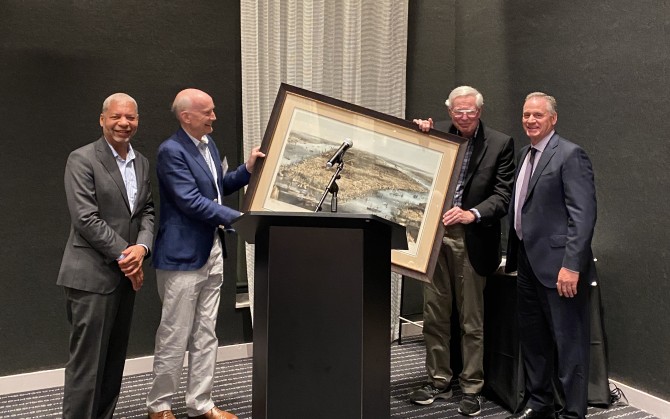He served on earthquake reconnaissance missions in Armenia, Japan, Turkey, Taiwan and Ecuador, studied the effects of Hurricane Katrina, Hurricane Sandy and the 9/11 attacks on underground infrastructure, and he tested vital pipelines for West Coast cities from Vancouver to Los Angeles.
Based on those contributions, Thomas O'Rourke, the Thomas R. Briggs Professor Emeritus in the School of Civil and Environmental Engineering, was honored July 14 with the inaugural Cornell Program in Infrastructure Policy Award. It was presented in front of prominent infrastructure policy leaders, academics, experts and practitioners gathered at Cornell Tech for an international workshop co-hosted by the Cornell Jeb E. Brooks School of Public Policy's Cornell Program in Infrastructure Policy (CPIP) and the Centre for Smart Infrastructure and Construction at Cambridge University.
The award was created to recognize dedicated, consistent efforts over the span of a career to improve the design, construction, operation, maintenance, financing or funding of civil and social infrastructure anywhere in the world.
Thomas O'Rourke (second from right) was honored July 14 with the inaugural Cornell Program in Infrastructure Policy Award. Presenting the award were (from left) Lance Collins, Lord Robert Mair, and Richard Geddes.
"It is hard to overstate Tom O'Rourke's contributions to the study of infrastructure during his 43 years at Cornell," said Richard Geddes, professor of policy analysis and management and CPIP academic director. "The impact of Tom's work on his discipline, on the university and on the broader community should be marked for years to come."
O'Rourke retired from Cornell in 2020 but has remained active at the university and elsewhere, including his continued service as associate director of CPIP. Throughout his career, his research has focused on how earthquakes and other natural disasters affect retaining structures, water and gas distribution networks, tunnels, and other infrastructure. He has provided consulting services to more than 140 projects in 13 countries, and in the U.S. studied the infrastructure aftermath of major floods, hurricanes and landslides.
"The award underscores the importance of infrastructure and Cornell's role in developing emerging technologies, as well as promoting the funding and financing of infrastructure," said O'Rourke, who helped found and guide the Cornell Geotechnical Lifelines Large-Scale Testing Facility in Thurston Hall, which developed next-generation, hazard-resilient pipelines and conduits used by cities to reduce the effects of natural disasters, including earthquakes and hurricanes.
O'Rourke is also well-known for his inspirational teaching, said Lord Robert Mair, professor of civil engineering at the University of Cambridge, who added that O'Rourke is a fun collaborator. "I recall a consulting project we both worked on in Turkey involving seismic design of tunnels in mountainous terrain, involving many adventures in snowstorms," Mair said. "A strong sense of humor and boundless energy are key characteristics of the way Tom operates. It's been a huge pleasure to have known him and worked with him for so many years."
Presenting O'Rourke with the award was Lance Collins, former dean of Cornell Engineering and now executive director of the Virginia Tech Innovation Campus. Collins recounted the story of how he enlisted O'Rourke in 2019 to help develop alternative solutions to renovating New York City's Canarsie Tunnel, a vital underwater subway path that was about to close for 15 months.
Collins said working with O'Rourke was "an opportunity to see a brilliant mind at work," and that O'Rourke was central to creating a plan that kept the subway open and the project $100 million under budget.
"As dean of engineering at Cornell, I came to rely on his wisdom and advice on all sorts of matters," Collins said. "His head contains incredible wisdom from decades of leadership throughout his profession; his heart has great empathy for all involved; but most of all, his humility meant that he stayed true to looking out for the world and the institution above all else."







